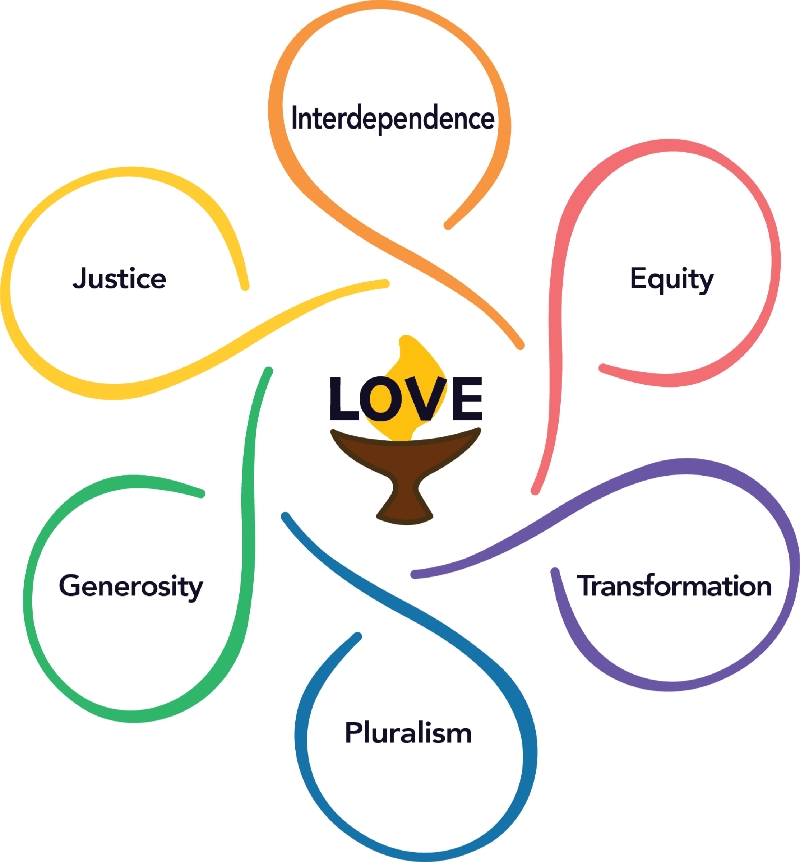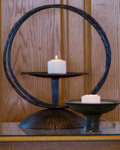Beliefs
On this page:
Shared Values
Former Statement of Principles
Celebrating Diversity
Flaming Chalice
100 Questions that Non-Members Ask about Unitarian Universalism contains answers to many questions about Unitarian Universalist beliefs.
Shared Values
In June 2024, the General Assembly of the Unitarian Universalist Association adopted the following Purposes and Principles to reflect the shared values of Unitarian Universalists:
Purposes
The Unitarian Universalist Association will devote its resources to and use its organizational powers for religious, educational, and humanitarian purposes. Its primary purposes are:
- to assist congregations in their vital ministries,
- to support and train leaders both lay and professional,
- to foster lifelong faith formation and spiritual development,
- to heal historic injustices,
- to support and encourage the creation of new Unitarian Universalist communities, and
- to advance our Unitarian Universalist values in the world.
The Unitarian Universalist Association will actively engage its members in the transformation of the world through liberating Love.
Values and Covenant

As Unitarian Universalists, we covenant, congregation-to-congregation and through our Association, to support and assist one another in our ministries. We draw from our heritages of freedom, reason, hope, and courage, building on the foundation of love. Love is the power that holds us together and is at the center of our shared values. We are accountable to one another for doing the work of living our shared values through the spiritual discipline of Love.
Inseparable from one another, these shared values are:
- Generosity
- Pluralism
- Transformation
- Interdependence
- Justice
- Equity
Interdependence. We honor the interdependent web of all existence. With reverence for the great web of life and with humility, we acknowledge our place in it. We covenant to protect Earth and all beings from exploitation. We will create and nurture sustainable relationships of care and respect, mutuality and justice. We will work to repair harm and damaged relationships.
Pluralism. We celebrate that we are all sacred beings, diverse in culture, experience, and theology. We covenant to learn from one another in our free and responsible search for truth and meaning. We embrace our differences and commonalities with Love, curiosity, and respect.
Justice. We work to be diverse multicultural Beloved Communities where all thrive. We covenant to dismantle racism and all forms of systemic oppression. We support the use of inclusive democratic processes to make decisions within our congregations, our Association, and society at large.
Transformation. We adapt to the changing world. We covenant to collectively transform and grow spiritually and ethically. Openness to change is fundamental to our Unitarian and Universalist heritages, never complete and never perfect.
Generosity. We cultivate a spirit of gratitude and hope. We covenant to freely and compassionately share our faith, presence, and resources. Our generosity connects us to one another in relationships of interdependence and mutuality.
Equity. We declare that every person is inherently worthy and has the right to flourish with dignity, love, and compassion. We covenant to use our time, wisdom, attention, and money to build and sustain fully accessible and inclusive communities.
Inspirations
Direct experiences of transcending mystery and wonder are primary sources of Unitarian Universalist inspiration. These experiences open our hearts, renew our spirits, and transform our lives. We draw upon, and are inspired by, sacred, secular, and scientific understandings that help us make meaning and live into our values. These sources ground us and sustain us in ordinary, difficult, and joyous times. We respect the histories, contexts, and cultures in which these sources were created and are currently practiced. Grateful for the experiences that move us, aware of the religious ancestries we inherit, and enlivened by the diversity which enriches our faith, we are called to ever deepen and expand our wisdom.
Inclusion
Systems of power, privilege, and oppression have traditionally created barriers for persons and groups with particular identities, ages, abilities, and histories. We pledge to replace such barriers with ever-widening circles of solidarity and mutual respect. We strive to be an Association of congregations that truly welcome all persons who share our values. We commit to being an Association of congregations that empowers and enhances everyone’s participation, especially those with historically marginalized identities.
Freedom of belief
Congregational freedom and the individual’s right of conscience are central to our Unitarian Universalist heritage. Congregations may establish statements of purpose, covenants, and bonds of union so long as they do not require that members adhere to a particular creed.
Former Statement of Principles
The Purposes and Principles above replace the following seven principles adopted in 1984, which individual Unitarian Universalists and their congregations are welcome to continue to hold and value as a meaningful part of the faith:
- The inherent worth and dignity of every person;
- Justice, equity and compassion in human relations;
- Acceptance of one another and encouragement to spiritual growth in our congregations;
- A free and responsible search for truth and meaning;
- The right of conscience and the use of the democratic process within our congregations and in society at large;
- The goal of world community with peace, liberty, and justice for all;
- Respect for the interdependent web of all existence of which we are a part.
Many congregations including this one had adopted the following 8th principle: Journeying toward spiritual wholeness by working to build a diverse multicultural Beloved Community by our actions that accountably dismantle racism and other oppressions in ourselves and our institutions.
Celebrating Diversity
As Unitarian Universalists, we celebrate and embrace diversity of both people and religious perspectives. We welcome people of all ethnicities; national, geographical or historical origins; colors; genders; physical or mental challenges or attributes; affectional or sexual orientations; gender identities; ages; and classes. We are a community of faith where young and old, partnered and single, gay and straight, skeptic and believer, and people of every race and background come together.
We are officially recognized by the Unitarian Universalist Association as a “Welcoming Congregation” because of our acceptance and support of the lesbian, gay, bisexual and transgender community (more information on the LGBTQIA+ Welcome page).
Diversity of belief also is a hallmark of our religious community. In addition to holding different beliefs on spiritual topics, individual UUs may also identify with and draw inspiration from Atheism and Agnosticism, Buddhism, Christianity, Humanism, Judaism, Paganism, and other religious or philosophical traditions. Our Unitarian Universalist faith has evolved through a long history, with theological origins in European Christian traditions.
Today Unitarian Universalism is a non-creedal faith which allows individual Unitarian Universalists the freedom to search for truth on many paths. While our congregations uphold shared principles, individual Unitarian Universalists may discern their own beliefs about spiritual, ethical, and theological issues.
More diversity information on the UUA website
Flaming Chalice

A flame within a chalice – a cup with a stem and foot – is the primary symbol of the Unitarian Universalist faith and represents the Unitarian Universalist Association (UUA) and its member congregations. In most UU churches, including ours, we light a flame in the chalice at the opening of our worship services and at the beginning of many other church group meetings. The chalice unites our members in worship and symbolizes the spirit of our work. The lighting of the chalice is usually accompanied by a brief reading.
Hans Deutsch, an Austrian artist, first brought together the chalice and the flame as a Unitarian symbol during his work with the Unitarian Service Committee during World War II. To Deutsch, the image had connotations of sacrifice and love. Unitarian Universalists today have many different interpretations of the image.
More information about the history of our Unitarian Universalist symbol.
The current official UUA logo (seen in the header on all pages of this website) was designed to offer a visual representation of a modern and dynamic faith.  The flaming chalice image has changed many times over the past 65 years. Modern chalice designs often incorporate two overlapping circles as seen here, which, for many people, represent our Unitarian and Universalist heritages. Other chalice images include additional elements, some of which are merely decorative and others which are very meaningful. One interpretation, the “World Chalice,” appears above.
The flaming chalice image has changed many times over the past 65 years. Modern chalice designs often incorporate two overlapping circles as seen here, which, for many people, represent our Unitarian and Universalist heritages. Other chalice images include additional elements, some of which are merely decorative and others which are very meaningful. One interpretation, the “World Chalice,” appears above.
UUCC’s Chalice

The Unitarian Universalist Church of Columbia, Missouri observed the 67th anniversary of our church’s founding at worship services on Jan. 28, 2018 that included dedication of a beautiful new metal chalice purchased and given to the church by a member couple.
The late Naoma Powell made the pottery chalice we had been using since 2006 after the congregation’s previous chalice broke, and it was always intended to be temporary. Naoma’s chalice served us long and well, but was showing signs of wear. To protect this beloved artifact, it was officially “retired” from active duty but will always have a place in our sanctuary and will still be used for special occasions.
The new chalice is larger and will be easier to see from all parts of the sanctuary, in keeping with the needs of our growing congregation. It was dedicated with Naoma’s own January 2006 words of dedication of the temporary chalice that is now retired:
Though chalice changes, the flame burns bright.
Not holder, not cup but flame that offers light.
Flame that lights the darkness.
Flame, in its burning, illumines night.
Flame, its double halo, bringing light to shadow, warmth to shade.
Flame, re-igniting
Constant.
Meet our Chalice Artist

Our new chalice that was dedicated at the Jan. 28, 2018 worship services was crafted by Ryan Schmidt, a metal artist based in Cumberland Gap, Tenn.
Ryan owned and managed a motorcycle repair shop in Kansas City before moving to Tennessee in 2015. Shortly after moving he met a neighbor, William Brock, a traditional blacksmith who taught Ryan the art of blacksmithing. Ryan’s passion is creating custom-made functional objects, ornamental ironwork, sculptures, and furniture. He is a member of several professional blacksmithing groups.
When Ryan is not creating art at his shop, Mitty’s Metal Art (https://www.mittysmetalart.com/), he likes to get out and explore the surrounding Appalachian region on his Harley or mountain bike. Ryan is not a UU but is familiar with our denomination through friends.
